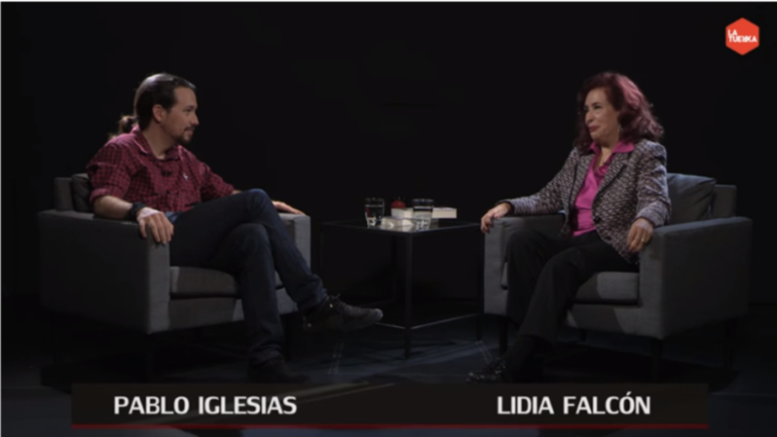Spain’s Izquierda Unida party, the junior political partner of the left-wing, anti-austerity Unidas Podemos coalition, has voted to expel from its ranks the leadership and members of the historic left-wing Partido Feminista de España (PFE) over a dispute as to whether transgender women who were born biologically male should enjoy the same rights and protection as biologically born women in Spain.
On Monday, the IU leadership announced that 85 percent of the party’s 200-member Political and Social Assembly had voted to eject the Feminist Party led by Lidia Falcón O’Neill, a 1970s student leader who was tortured during the last years of Spain’s Franco dictatorship and an historical leader of Spain’s post-Franco feminist movement, due to the feminist organization’s “repeated statutory breaches and holding positions contrary to those approved by the IU (party) organs.”
As recently as November 2016, Falcón had been praised by Unidas Podemos leader Pablo Iglesias on his online Otra Vuelta de Tuerka television program as “the perrenial voice of women in Spain”.
► CLICK ABOVE TO VIEW LIDIA FALCÓN INTERVIEW WITH PABLO IGLESIAS ►
But, in recent months the historic feminist leader had begun to say she is “radically against” the proposed national Comprehensive LGBTI Law supported by Unidas Podemos, as well as the coalition’s Trans Law proposed last year, which call for the freedom of individuals to determine their own sexual identity and gender expression regardless of the biological genitalia with which they have been born.
“We women no longer exist, we are now only a gender, but gender violence is directed at women, not at a gender,” Falcón said recently, defending the PFE’s position. “If these laws are passed in Spain we will live the same nightmare as women do in England, being forced to share public toilets with transgender women who have not yet had sex-change operations.”
► News Sources: El País, El Diario and 20minutos …
The PFE believes that the blurring of lines between men and women serves to undercut the women’s movement, which the feminist party says remains the principle defender of women’s rights in Spain. “The categories of women and men have disappeared”, Falcón said recently, “and if women no longer exist, then the feminist movement would deemed unnecessary.”
As the debate grew over the IU and Unidas Podemos support for the LGBT position in favour of an individual’s right to self-identify as a woman regardless of biological genitalia, the Feminist Party began to lose sway over the direction of the IU’s policies on feminism and sexuality. At the same time, the feminist organization’s rhetoric took on a more strident tone, with the party issuing a statement in December opposing the Unidas Podemos support for the Trans Law and accusing gay and transsexual groups of spearheading “ideological propaganda movements” that would ultimately result in “making women invisible” in Spain.
In recent months, the PFE had also begun to reference the “dire consequences” of allowing children who self-identify as transexual to access hormonal treatments and sex-change operations, or for adults to do so without previously consulting a psychologist — the latter being a complete affront to Spain’s LGBT and trans activists, who have long fought for the de-pathologization of transgender identity in keeping with UN recommendations that transgender individuals not be considered as suffering from an “illness” that requires medical or psychological treatment.
Founded in 1983 in Barcelona, the PFE grew out of a radical, left-wing feminist organization known as the Organización Feminista Revolucionaria, co-founded by Falcón in 1977 as Spain transitioned to democracy following the death of dictator Francisco Franco two years earlier. In 1999 European Parliament elections, the party promoted the creation of Spain’s Confederation of Feminist Organizations, winning 28,901 votes for 0.14 percent of total ballots cast in the election.
In 2015, the PFE elected to join Izquierda Unida in order to participate in the general elections that year as part of a progressive “united front” movement against the conservatve Partido Popular government under then-President Mariano Rajoy. The party’s expulsion by IU marks the end of the five-year association between the two organizations.
► Click to read more news about Women’s Rights in Spain…
Check out more news from Spain about:
► Animal Welfare ► Corruption/Transparency ► Discrimination ► Education ► Elections ► Environment & Sustainability ► Fair Trade & Development Aid ► Healthcare ► Historical Memory ► Housing & Homelessness ► Human Rights ► Labour & Unemployment ► LGBT+ ► Politics ► Poverty ► Refugees & Migration ► Technology & Social Enterprise ► War & Peace ► Women’s Rights

All images at ProgressiveSpain.com are the copyright of their respective authors/owners and are reproduced here for non-commercial, journalistic purposes in accordance with Fair Use doctrine. All other content is Copyright © 2015-2020 ProgressiveSpain.com and is licensed under a Creative Commons Attribution-NonCommercial-ShareAlike 4.0 International License.

